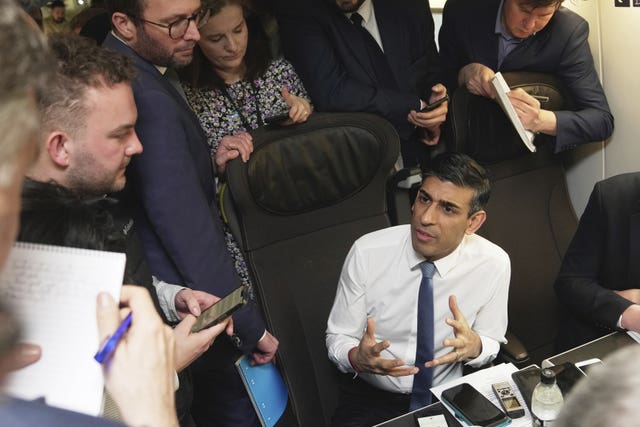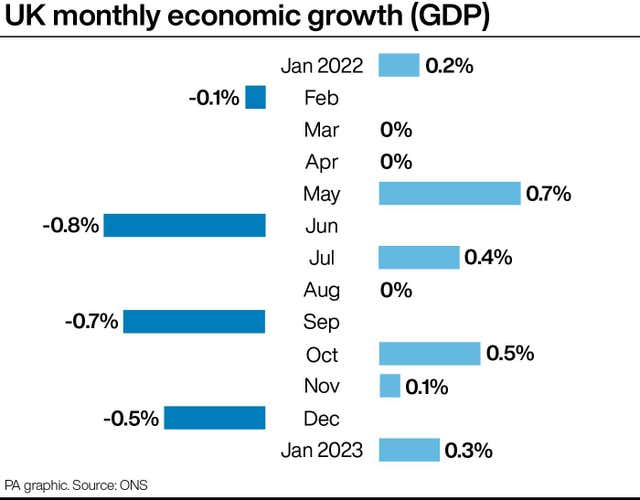UK’s economy returns to growth after rebound in entertainment and transport
The Office for National Statistics said the economy grew by 0.3% in January, following a sharp 0.5% decline in December.

The UK’s economy returned to growth in January, easing fears of an impending recession ahead of Chancellor Jeremy Hunt’s spring Budget, official figures have shown.
The Office for National Statistics (ONS) said the economy grew by 0.3% in January, following a sharp 0.5% decline in gross domestic product (GDP) in December.
The Prime Minister said it shows the “underlying fundamentals of the economy are strong”.
Rishi Sunak told reporters on the Eurostar travelling to Paris for the UK-France summit: “If you look at some of the things that have been coming out in the last month – construction, PMI, the overall PMI – they’re all showing encouraging signs that things are better than people had feared, that sentiment is improving, confidence is returning.
“That is, I think, partly a function of the plans that we’ve put in place, having stabilised the economy in the autumn and it was an important first step, you’re seeing borrowing costs coming down, mortgage rates are coming down, those are all positive signs.”
He added: “They show our plan is working, that it’s the right one, and we need to stick to it. But beyond that, I’ll leave it to the Chancellor next week.”

Nevertheless, looking at the broader picture, GDP was flat in the three months to January as the UK narrowly avoided falling into a recession at the end of last year.
The biggest driving forces behind January’s growth came from the services sector, which grew by 0.5% after falling by 0.8% in December.
The influential S&P Global/CIPS UK services PMI survey, which Mr Sunak referred to, showed that the UK’s services sector grew in January for the first time in six months and at the fastest pace since June.
Other industries like education also drove up GDP as children returned to classrooms, after an unusually high number of absences in the run-up to Christmas, the ONS said.
The transport and storage sector also returned to growth as postal services partially recovered from the effect of December’s strikes.
December’s GDP figures were affected by several days of rail and postal strikes and also declining output in the entertainment sector, as the football Premier League took a break for the World Cup.
January’s figure beat expectations with analysts predicting that the economy would eke out 0.1% growth in the month.

Darren Morgan, the ONS’s director of economic statistics, said: “The economy partially bounced back from the large fall seen in December.
“Across the last three months as a whole and, indeed over the last 12 months, the economy has, though, showed zero growth.”
Furthermore, the construction sector declined by 1.7% after being flat in December, which the ONS said could partly be owed to heavy rainfall in the first two weeks of January slowing down building.
But housebuilders have flagged a general decline in work recently amid a slowdown in the housing market.
Chancellor Jeremy Hunt is due to deliver his spring budget on Wednesday, which will set out the Government’s plan to stimulate economic growth.
Mr Hunt said: “In the face of severe global challenges, the UK economy has proved more resilient than many expected, but there is a long way to go.
“Next week, I will set out the next stage of our plan to halve inflation, reduce debt and grow the economy – so we can improve living standards for everyone.”
Labour’s shadow chancellor Rachel Reeves said the GDP figures show the economy is “inching along this Tory path of managed decline”.
She added: “People will be asking themselves whether they feel better off under the Tories, and the answer will be no.
“What we need now is the ambition to grow our economy so every part of Britain feels better off, which is what Labour’s mission to secure the highest sustained growth in the G7 will do.”





